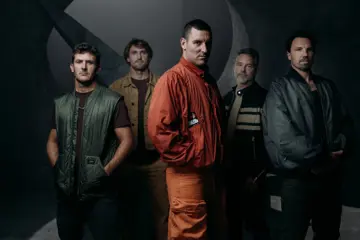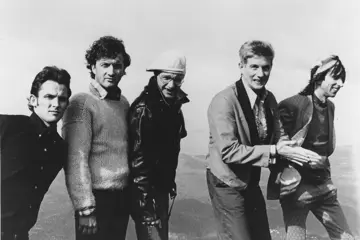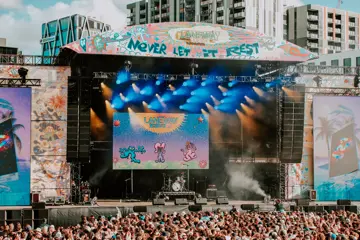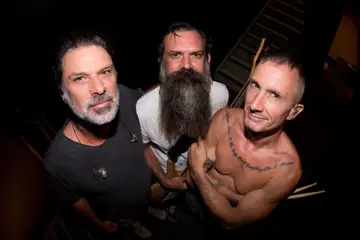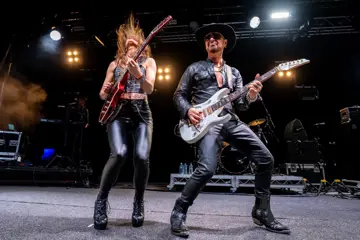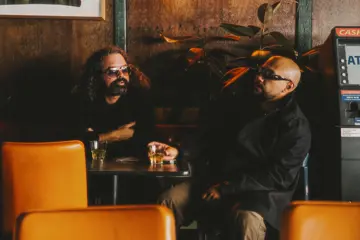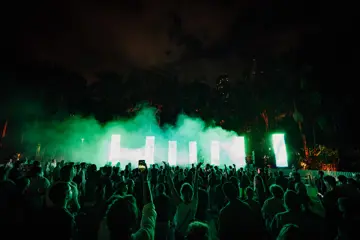 Converge
Converge“To be honest, I genuinely don't pay attention to it,” responds the 36 year-old musical entrepreneur to a question regarding the band's continuously positive critical adoration. He's had years to get used to it - while their previous output was by no means unworthy, Converge truly turned the world of heavy music on its head with the 2001 release of Jane Doe - an album often seen as a clearly defined rebirth in the band's stunning discography, of which the iconography and influence is immediately recognisable throughout heavy music all across the globe. More specifically however, he speaks in relation to their eighth and most heavily publicised full-length to date, All We Love We Leave Behind.
“I appreciate the fact that people give our band the time of day, and let our music into their lives in some way,” he continues. “You can't really take it for anything more than that, ever, because everybody's experience with music is subjective and is wholly their own. If we started paying attention to people's opinions of how we make music, what we do, what's valid, what's not, what's good, what's not, we'd cease making music that's honest. To us it's just about putting our heads down, writing music that is fulfilling to us, and sharing it with people. If I allowed it to have weight, then I think we would start making different kinds of music. We would start making music to appease people, and to please people, and meet people's aspirations of what is good. For example, every record you do someone's going to say it's the best record you wrote, or the record before it, or the record after it, because everyone has their favorite record, and you just can't look at music that way. Music is all about the now.”
With that in mind, Bannon continues to explain why a band's latest release should always be their most important - evidently, it seems anniversary tours are for suckers.
“I think we're always the most emotionally in tune with the most recent record we've released. I think that's the way bands should be, because if you're not, you're doing something wrong. I've always felt that it was odd when bands do a tour of like their old hit record or something like that, because that's discrediting the emotional substance, and artistic substance of the records they did after that. For me, I wouldn't want to put out something that was anything less than the record before it. I feel like we should always be refining what we do, improving on what we do, and becoming more coherent artists, and more technical players in the world of music that we live in. The more we do that, the more we move forward, hopefully that's reflected in our music. If it wasn't, we probably just wouldn't be in a band. We'd just stop.”
Converge has retained the same lineup for well over a decade now, a feat that is relatively unheard of in heavy music, which typically sees members swapping and dropping like flies. Prompted to explain his band's longevity, Bannon reveals how much life on the road can make or break a unit in the early days.
“When we were kids, we all had different responsibilities in life - it was sometimes difficult to focus wholly on music. For example, when I was going to college, I was paying for college myself, paying for my apartment, my food, and just my living, and there was those expenses, and it was regimented, so you didn't really have the time and the energy to be able to play in a band at will. You could go on tour for two weeks at a time, otherwise you're locked into a full time job or full time school. It wasn't an option. There was no social life, there was no anything for those years. It was just school, work, school, work. When you're doing those things, it's tough to get a lot of people in line with the same sort of available timetable. You have a lot of pressures from the outside world, whether it be family, friends, or just society at large, to participate in a different way. So you get the fabric of bands getting pulled at a lot.
“We shed a couple of drummers for that reason. We lost the second drummer we ever had, he did one European tour with us, and it essentially broke him. He couldn't get over the lack of sleep, the amount of work, you're basically sleeping two or three hours a night somewhere on the ground in a squat for six weeks at a time, eating whatever food someone's generous enough to give to you. Those are hard tours, and they broke a lot of people. A lot of people can't get through that sort of thing, nevermind financially sacrificing a lot to be there, to do that. Paying for your own plane tickets, coming home, spending thousands and thousands of dollars, it's a hard lifestyle to romanticise and to maintain. That's what sheds a lot of members, and that's a lot of what causes changes... like when we were kids, people would want to do it, they'd be excited, they'd want to tour, and it'd be a week or two into a tour and they'd want to die. You don't have personal space, you're nomadic - you don't have that ability to do much of anything that is in your control.”
Since bassist Nate Newton and drummer Ben Koller joined Bannon alongside fellow founding guitarist Kurt Ballou around the turn of the century, Converge have held it down as a four piece. They are the definition of eventually massive success through persisting with a DIY approach. The band is still self-managed, still tours in a van that they drive themselves, Ballou still records all their music, and Bannon still designs all their merch and artwork, as well as putting out the vinyl editions of their releases through his own Deathwish Inc. label.
When asked about how he feels about the recent closure of Hydra Head Records - a label run by a long time friend of Converge's, Aaron Turner of ISIS, who is in fact a member of and released the latest record from Newton side-project and Australian tour mates Old Man Gloom - the poetic yet savage vocalist has plenty to say.
“You should always be concerned with the future of all labels, because that's a huge reality. If Deathwish was smart, were intelligent, rather than releasing music because our hearts in it, we would have closed a long time ago. There's been years and years of our business where we've operated in the negative. For the first seven years of our business I didn't get paid a dime, and I still worked full time. It's a labor of love. It's music and it's a community, and it's us giving ourselves to it because we believe in the power of aggressive music. It's very important for people not to take that for granted. I see not only labels breaking up, but bands breaking up because of this all the time. When bands break up, more often than not you hear of in-fighting, or things like that, but usually, all of that stems from outside pressures and stresses that come from functioning as a band, which is essentially a small business. It's a hard sell business and you're putting everything you have into it, and eventually people get worn down, and they get broken.”
“The Hydra Head situation, they got tired of being broke, and that's a difficult place, and all small businesses have to deal with that in some way. It's a very different, difficult world to exist in. As labels we have to support our artists, we promote our artists, and to make the world see and experience their music, yet it's usually easier to steal the music than it is to purchase it. We exist in a world where we have to literally convince people that the things we love, that we put our hearts into, is something of value. There's no other world where... no economy that exists like that.”
So does Bannon believe that widespread illegal downloading been a positive or a negative thing for heavy music?
“I don't know - it depends really,” he responds, pensive for only a second. “It's a different kind of music community now, where things can be very instantaneous. You can have a band that can come up that can be really talented, really interesting, and all you have to do is record an album at home, and share it. That way there is no investment - there isn't much in it. It'd be great if everything was that utopian, but it's not. If it was that utopian, where we could exist in a world where people didn't pay for music, but everybody went to shows, then that would mean that every show that every band played there would be thousands of people at it, and it would be a joyous and positive experience, and everything would be happy to pay their fucking eight to fifteen dollars to get into a show, and would be very helpful, and very enthusiastic.”
The situation through his eyes is however quite different.
“In reality you get people who complain about door prices for shows, you get promoters who try to screw over bands, you have people that try to steal merch from bands, you have venues that try to take a merch percentage from bands, where that's really the only source of income, because the expense of just being there is so much that it's just not really that profitable to be able to travel thousands of miles to be able to play a show necessarily. You have to constantly worry about your gear being stolen, vehicles get stolen, things get broken into. You can go pay for gas at a gas pump with a credit or debit card and you can lose all your fucking money, because someone hacked the little computer that's in there. That's the world we live in. That's reality. That's not like a reality where people download records and then everyone goes to a show and everyone lives happily ever after.”
Despite his acute vision of the situation, it is still obvious that Converge exists without allowing financial considerations to cloud their admirable intentions.
“It's not about conquering, it's not about making money... it's about going out and sharing music with people,” says Bannon of their consistent drive to tour. “We'll play wherever, as long as we have the time to do it.”
Converge will be playing the following shows:
Tuesday 12 February - Amplifier, Perth WA
Wednesday 13 February - Fowlers, Adelaide SA
Friday 15 February - Billboard, Melbourne VIC
Saturday 16 February - Manning Bar, Sydney NSW
Sunday 17 February - The Hi-Fi, Brisbane QLD

